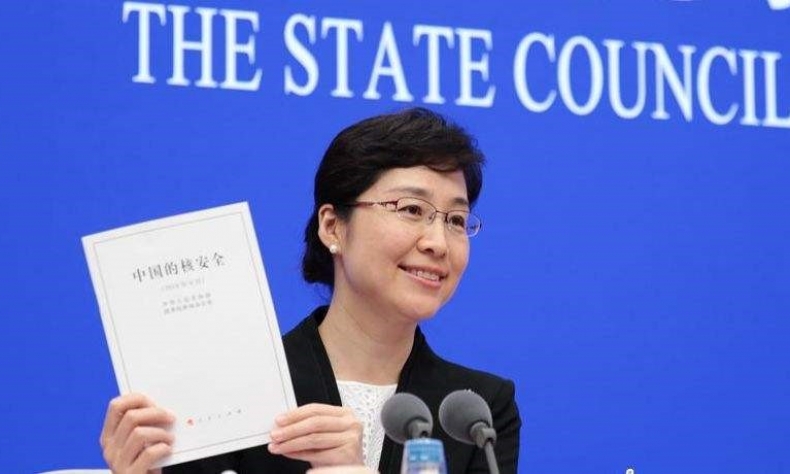What Signals Does China’s First White Paper on Nuclear Safety Send?

The US unilateralism and bullying behavior has undoubtedly led to the rise of nuclear proliferation and nuclear safety risks.
China regards nuclear safety as its top priority
As a responsible world power, China attaches great importance to the nuclear safety, adheres to the principle of safety first in nuclear energy development, and has maintained a good nuclear safety record all the time.
As a permanent member of the UN Security Council, China has been earnestly fulfilling its international obligations, vigorously promoting bilateral and multilateral cooperation in nuclear safety and playing an active role in promoting the peaceful use of nuclear energy. Chinese President Xi Jinping attended the 2014 Nuclear Security Summit held in The Hague of Netherlands, and the 2016 summit in Washington, DC, the United States. He put forward a rational, coordinated and holistic approach to nuclear safety, advocated building a fair, cooperative and win-win international nuclear safety system. President Xi also proposed to build a community based on nuclear safety with a shared future, contributing China’s wisdom and strength to promoting international cooperation in the development and utilization of nuclear energy and global nuclear safety governance.
Rising global nuclear risks
In 2001, the United States withdrew from the Anti-Ballistic Missile (ABM) Treaty, and then in 2019, unilaterally withdrew from The Intermediate-Range Nuclear Forces (INF) Treaty signed with the former Soviet Union. Russia responded by also withdrawing from the INF treaty. The New Strategic Arms Reduction Treaty (New START), signed in 2010, will soon become obsolete as the United States has repeatedly vowed not to extend it after its expiry date in 2021. The stagnation in the Korean Peninsula de-nuclear process, the US unilateral break of the Iran Nuclear Agreement and subsequent unilateral sanctions on Iran, have all enhanced the risks that global nuclear orders established during the cold war could collapse.
The US unilateralism and bullying behavior has undoubtedly led to the rise of nuclear proliferation and nuclear safety risks, inevitably aggravating the international community’s concerns about nuclear safety. While nuclear safety is an issue of global governance, countries at the forefront of nuclear technology development have the responsibility for actively participating in regional and global nuclear governance and jointly controlling the global nuclear risks currently facing the international community.
Against this background, it is urgent and necessary for China to issue the White Paper on Nuclear Safety. As the first White Paper on Nuclear Safety issued by the Chinese government, it outlines the development process of China’s nuclear safety cause, states the principles and policies of China’s nuclear safety, details the concept and practice of China’s nuclear safety supervision, and clarifies China’s determination and action to promote the process of global nuclear safety governance.
The significance of the white paper on China’s nuclear safety
Nuclear energy development is always a public concern. China plays an active role in global nuclear power market. The publication of the White Paper on Nuclear Safety comes in response to the public’s concerns, which reflects the great importance that China attaches to nuclear safety and also helps enhance the public’s support for China’s nuclear energy development.
As the largest developing country in the world, the development of nuclear energy is not only an established policy of the Chinese government, but also the strategic choice made by China as a nuclear power.
It is important for China to develop clean and efficient energy to meet its energy needs whilst at the same time fulfilling its commitment to protect environment and address the challenges posed by climate change.
The release of the White Paper on China’s Nuclear Safety has strengthened the confidence of the international market in China. Nuclear power, along with high-speed rail, become a national brand for “Made in China”. This will help promote China’s nuclear power “going global” and cooperation in nuclear power with other countries. The participation of China’s nuclear power technology in investment, construction and operation of nuclear power plants worldwide will help China take part in the formulation and promotion of international standards in the field of nuclear power. Such ambitious projects will increase China’s position in the international industrial chain, and enhance the international influence of the “Made in China”.
Finally, the release of the White Paper on China’s Nuclear Safety is conducive to the further cooperation between China and other countries in nuclear safety technology. Today, nuclear industry requires more international cooperation with which countries can exchange experiences in accident prevention and response. In this regard, the White Paper undoubtedly plays a positive role. The release of the White Paper on China’s Nuclear Safety will also promote China’s efforts with other countries to further enhance domestic and international nuclear safety in accordance with the safety standards of the International Atomic Energy Agency.
Jiang Zhenfei, associate professor of the Research Center for American Studies at Zhejiang University.
Edited by Dong Lingyi, Jamie Leigh Wright
 Facebook
Facebook
 Twitter
Twitter
 Linkedin
Linkedin
 Google +
Google +










